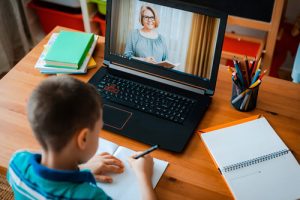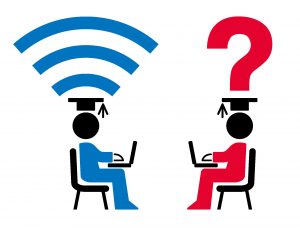Having grown up in a major city and attending public schools, I always knew in the back of my mind that there were certain inequalities in education. Some students had a much longer commute to school and therefore had less time to do homework and others may have had to work a job to support their family. Some students may have struggled in classes but have been unable to afford a tutor or receive help from their parents, causing them to fall further behind their peers. For example, my public school in Chicago occasionally shut down due to the cold, because some students didn’t have the necessary clothing to stay safe on their way to school. At the time, I never thought anything of it and would instead just be happy that we had a day off from school, unaware of the larger issues that this represented.
COVID has brought these inequalities to the forefront. The spread of COVID has left many schools with no choice but to go online in order to protect the lives of teachers, students, and whoever may come into contact with those groups. Online-learning is difficult for most students, but the fortunate ones typically only have to deal with distractions and lack of motivation that make completing work difficult. Millions of students, however, have extenuating circumstances that may make it almost impossible to complete their school work. Learn java full stack course online for the best career opportunity.
When my sister’s public high school first went online in March, she didn’t have formal classes for almost 2 months. A number of things led to this slow process to become virtual. There was a lack of personnel and training that made it so teachers knew how to teach in an online setting. Many students didn’t have internet at home and the libraries that they would typically go to were closed down. It took the entire summer just to provide computers for all the students who didn’t have access to one. For these students, they essentially went months without any schooling at all. Since there was no immediate solution to these issues, even if they only affected a small percentage of the students, the entire system suffered. My sister is fortunate that she has the resources needed to perform to the best of her ability at home, but it still hasn’t been a rosy experience for her.
The educational effects may be seen for years in the future. Current elementary school children may find themselves years behind the level that students are typically at for their age. Young children who rely on school for developmental progress, such as making friends and understanding proper behavior, may be permanently stunted. While standardized tests are being required at fewer and fewer schools, some students may only be able to afford tutoring or the actual test through their school and this may affect their acceptance to college. We may not know the full effects that the lack of in-person schooling will have until long after this pandemic ends.
The problems go beyond just educational issues. For some students, school is a safe space for those who may not have a good home life. Students who are part of the LGBTQ+ community may be only able to be their true selves at school. Victims of domestic abuse may use school as a safe haven. For many children, especially in my city of Chicago, the free breakfast and lunch provided at school may be some of the only nutritional meals that a child has access to. These issues are ones that existed before COVID but weren’t nearly as detrimental since students were able to spend much of their time at school. School previously served as a bandaid to many of these issues, but the sudden and unexpected lack of access to schools demonstrates that this is not nearly sufficient of a solution anymore.
The list of differences between those who have resources and support at home compared to those who don’t could go on and on. Educational inequalities were an issue that should have been addressed even before COVID hit, but now it is becoming virtually impossible to ignore any longer. If any student isn’t able to get a good education due to causes that are beyond their control, then the system has failed. Currently, there isn’t a perfect solution to these issues that have existed but are just now coming to light, but I hope that the current situation influences educational and social policy to make the problems highlighted above a thing of the past regardless of whether there is a pandemic or not.
Posted By Abby Hack
Posted Nov 19th, 2020




3 Comments
Iain Guest
November 21, 2020
This is such a good and thoughtful blog! There are so many different aspects to this challenge of distance learning. Earlier in the year we looked at the impact on High Schools students with learning problems, the children of undocumented immigrants, kids who don’t have English as a first language etc. The conclusion was exactly as you write – always more difficult for these families. In fact, you make a point about crisis in general, including humanitarian disasters, refugee movements and war – they always fall hardest on the vulnerable. So here is one question for you, Abby. Can you think of a response? Is there an organization that is responding in a way that you admire? Is so, can we help or promote their good work? Not that we need any new tasks, but let’s try and think practically. This excellent, mature blog certainly rounds off a great semester for you at AP!
Mary Ellen Cain
November 23, 2020
Abby, what a thoughtful breakdown on the virtual school experience for young students. Growing children are seriously being affected by this crisis, especially those with little family support who, even in normal times, depend on the school systems for academic, social and nutritional assistance. Hopefully the extra attention focused on this issue through the pandemic will increase public awareness and support for our most vulnerable young citizens.
Lisa Olaynack
December 5, 2020
Abby, you are wise beyond your years. I teach in a diverse community and I am worried about the same issues.Our community was as able to get every student a device and WiFi. I fear their screen time will add to the impact of this pandemic. I am most concerned with our vulnerable students and families. We know that academically our students will be behind. Most importantly, the students’ emotional well being is what needs the attention of our country, state and local officials. We need to raise awareness and get our students and families what they need to heal from this pandemic.